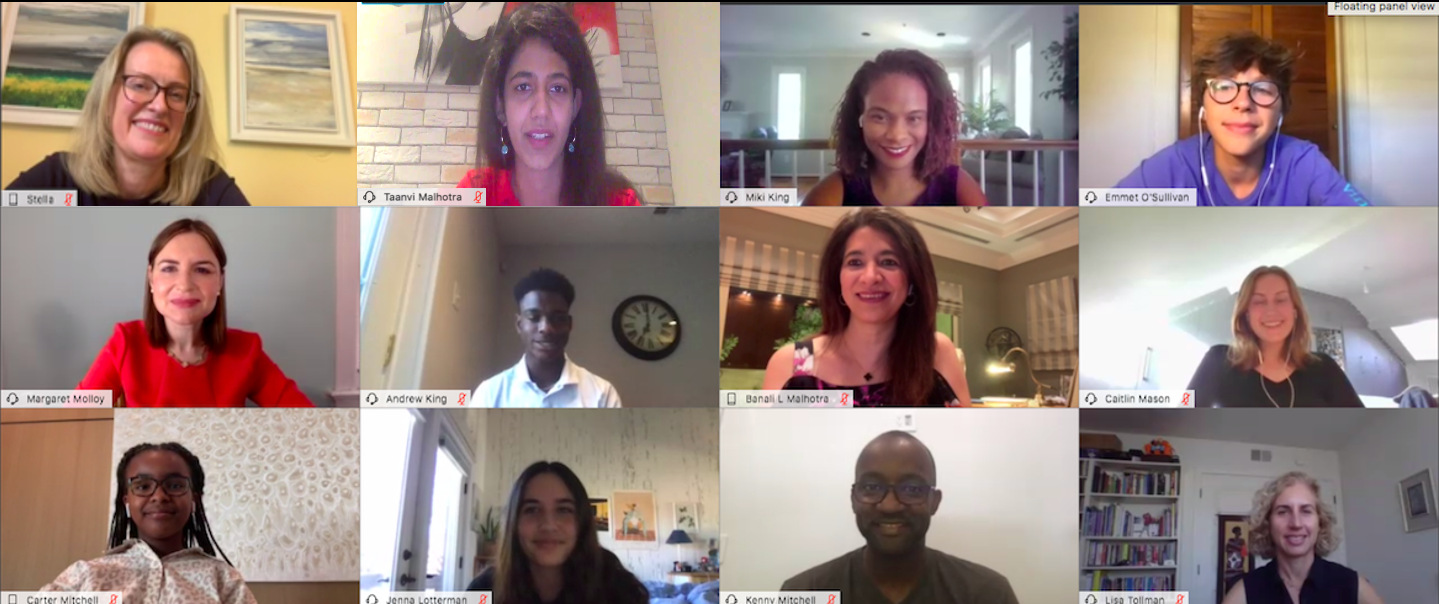Our Future of Branding series returned for its second season on Wednesday, August 26. One of the most inspiring episodes of our first season featured a conversation with six Gen Z kids of leading global marketing executives. As the world focuses on back to school, our second season premiered with a brand new Gen Z edition.
The teens we heard from represent the first truly digital native generation: they have been exposed to the internet, social networks and mobile systems from youth. Today, this generation is influencing over 80% of the purchases of their households. By 2030, they will comprise 30% of the workforce.
Together with the kids and their parents, we discussed where this incredibly conscious generation learns about new trends, the increasing power of social media influencers and the chasm between personalization and privacy. In closing, I asked the CMO parents: what struck you from listening to the discussion? And what’s your commitment to staying engaged with Gen Z? Here’s what the they had to say about branding for Gen Z.

Regularly seeing advertisements on their mobile devices has made this generation far more acutely aware of marketing than I know I was at the same age. What was exciting and something that I think is important is this notion of experiences. It is a bit of counteraction to how ephemeral interactions can be on mobile. This idea of going out and experiencing things, like taking a flight or going to a concert, having live experience as a part of one’s personal interaction and journeys is extremely meaningful to this generation.
It is table stakes for marketers, particularly myself, with the work that we do, to be directly connected to our community, which we often call the Snapchat generation—primarily Gen Z and younger millennials. For me to do my job well, I have to be plugged in. From a consumer insights perspective, we are continually having conversations with our community to understand their motivations, beliefs and behavior; it helps inform a lot of the programming and practices that we have. We’re continuously looking to get a pulse on the Gen Z audience because it’s so critically important to our brand, our success, how we market, how we think about product development, how we think about content and how we think about serving this community. And I definitely get some one-on-one time with my personal Gen Z panel member, Carter, and getting her opinion on things.
—Kenneth Mitchell, Chief Marketing Officer, Snap Inc.
It’s fascinating just how important a lot of the societal matters are to this generation. Compared to when I was younger, we didn’t have access to a lot of the information that is now available. Today, there is nowhere for brands to hide. That’s an incredible thing because brands have to live their values and become very purpose-led. It’s something that I think a lot of brands need to focus on right now, to look deep within their business and think about the value that they’re bringing to society and make sure that there is nothing within their supply or value chain, that is causing problems.
One of the key things we are doing at Ericsson is ensuring we are attracting the next generation of talent and making the world of tech an exciting place to be. We work very closely with schools, encouraging girls into STEM subjects and also urging schools to focus on the sciences and technology. We do a lot of sponsorships and competitions with schools. Because we’re a global company, we have a presence in 140 countries, many of our employees also take that commitment on themselves. In the UK, for example, we work closely with Girls Talk, an organization that focuses on girls in underprivileged areas. We provide mentoring support and help them at the stage where they’re applying to universities, getting them into the STEM subjects and encouraging them to take sort of different directions in life.
—Stella Medlicott, SVP, Chief Marketing & Communications Officer, Head of Marketing & Corporate Relations, Ericsson
What struck me is the fact that this is an incredibly conscious generation. I would echo what some of the other parents were saying. As a teenager, I don’t know that I had any idea what the brands that I supported stood for. Today, these participants understand what their brands stand for. Even the brands they like in terms of the product and service, but they may not necessarily like what the brands stand for. This generation understands that dichotomy. As marketers, we have to be incredibly conscious of that. Indeed, there is nowhere for brands to hide. These kids, if they don’t already know what you stand for, they will find out, they will share it. So, I think that being aware of that is incredibly important and this panel amplified that today.
In terms of my commitment, it’s two-fold: continuing to listen but also communicating the values of our organization, as we try to become part of this generation’s news consumption diet. We heard two things today that I think are incredibly important and that was the data and the privacy question. We heard that these kids don’t love when a company takes their data and then begins communicating with them in a way that they didn’t give them permission to. We also heard about the importance of the personalization experience. So, we saw both sides. We saw both the problem with data collection and the advantage of improving the experience as a result. As marketers, we have to commit to communicating how we are utilizing data, collecting it, how we’re going to be utilizing it and then helping our consumer understand how we can create a better experience for them with the proper use of data. That will be our challenge moving forward, and its one that we’re committed to at The Washington Post.
—Miki Toliver King, Chief Marketing Officer, The Washington Post
The things that particularly struck me were the importance of word of mouth, the importance of influencers, and the importance of accessibility to information. Historically, healthcare has been very much in the space of we’ve got great medicines that people need, and if we deliver those medicines, everything will be okay. But we need to dive deeper to understand the current issues of Gen Z, how they are consuming information and thinking holistically, and that we are communicating our values, and how they may line up with what’s essential to these really important consumers. It’s not about us; it’s about the people receiving our goods, services and products, and how we can make their lives better.
In terms of commitment, it’s not just not being company-centric, but being customer-centric. We are continually listening to patients, physicians and nurses to better understand their needs and how those needs evolve. Just think about how dramatically needs have changed over the last six months. So, we are committed to having our ear to the ground and considering how we communicate and express what we do to this new audience.
—Lisa Tollman, Executive Director, Head of US Marketing Operations & Innovation, Amgen
Brands will need to draw a fine line between using data while delighting customers. Very often, hyper-personalization is the way to go. Targeting is very important for marketers to understand, so that you can be a moment of delight and joy. But that invasiveness can also creep consumers out. It’s a balancing act because while we are all moving towards data and want to get into first-party data and harnessing data, we need to get it right. I think Gen Z is echoing pretty much the same thing as well. It was a great learning for me. And while we all know social media is essential, influencers play a big part in this generation. That’s stood out for me. Even though I understood the significance of influencers, I didn’t realize the extent of their impact.
Regarding commitment, our brand invests in many applications and products targeted specifically for Gen Z. Everything is digital-first. We recently started our “back to school” campaign and we have a newly launched app called Skiply, where you can skip the queue and pay your school fees online. It’s like a social community app, as well. We are investing heavily in marketing those tools and keeping Gen Z in mind. We continue to do that, along with sponsorship scholarships and those kinds of programs. That is an important segment for us.
—Banali L Malhotra, Director, Marketing, RAKBANK
This is a biweekly series for brand-side senior marketers. To request an invitation, visit events.siegelgale.com


